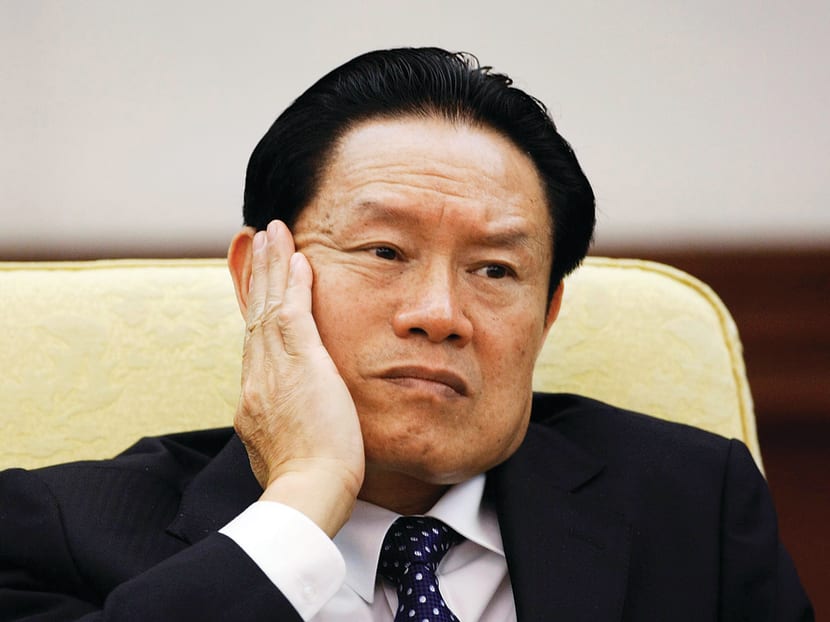Former leaders ‘agreed to Xi’s probe into Zhou’
BEIJING — Two influential former Chinese leaders gave their consent for President Xi Jinping to investigate former domestic security chief Zhou Yongkang, said sources, a sign that the corruption probe would not open a rift in the ruling Communist Party.

Former Chinese Public Security Minister Zhou Yongkang. Photo: Reuters
BEIJING — Two influential former Chinese leaders gave their consent for President Xi Jinping to investigate former domestic security chief Zhou Yongkang, said sources, a sign that the corruption probe would not open a rift in the ruling Communist Party.
Mr Xi would not have been able to investigate someone as powerful as Zhou without the agreement of senior party members and other retired top officials, said political analysts.
However, less clear is whether the elite is starting to get jittery over Mr Xi’s expanding graft crackdown, which is spreading fear throughout the party and the government.
The Chinese President has made fighting pervasive graft a major theme of his administration and promised to go after “tigers” — or senior officials — and “flies”, or those of lower rank, as part of his effort to restore the party’s tarnished image.
Mr Xi’s predecessors Hu Jintao and Jiang Zemin approved the formal investigation into Zhou, the most senior Chinese official to be ensnared in a graft scandal since the party swept to power in 1949, two sources with ties to the leadership said.
The party said in a statement on Tuesday that Zhou was being investigated by the party’s anti-corruption watchdog for suspected “serious disciplinary violations”, the usual euphemism for graft, though it could imply other wrongdoing. The statement made no mention of laws being broken.
Zhou, 71, was the security tsar in the Politburo Standing Committee — China’s apex of power — for five years until he retired in 2012.
“Jiang, Hu and Xi reached a consensus to deal with Zhou for violating party discipline,” one of the sources said.
Former top leaders in China usually wield a lot of influence behind the scenes in a political system that prizes consensus decision-making. Both Mr Jiang and Mr Hu, as former presidents and heads of the party, still have allies in office.
The party statement did not detail wrongdoing by Zhou, but the sources said he had been accused of corruption involving family members and political allies, as well as accepting bribes to promote officials.
“Not all charges against Zhou will be made public,” added the source, who requested anonymity.
Zhou, who was last seen at an alumni celebration at the China University of Petroleum on Oct 1, could not be reached for comment. It is not clear if he has a lawyer.
Another source with leadership ties said Mr Xi was also considering a proposal to let the Central Committee decide whether to press criminal charges against Zhou after anti-graft investigators detailed their case, as opposed to having the matter dealt with internally by the party.
“This would be a first if Xi decides to let the Central Committee vote whether to put Zhou on trial,” the source added.
By breaking an unwritten rule that members of the Standing Committee will not come under scrutiny after retirement, Mr Xi may risk antagonising other party elders, who fear that they and their families can be next if the crackdown does not ease off after Zhou’s investigation, analysts said.
Mr Xi’s campaign has sown so much fear that many officials are doing anything to stay out of trouble — from dithering over approving major projects to seeking early retirement. Some top executives under investigation at state-owned enterprises have committed suicide.
About 30 senior officials at the provincial and ministerial level or above have been put under investigation for corruption since December 2012, state media has said.
A commentary by official Chinese news agency Xinhua yesterday said the probe “clearly terminated a myth among many people that senior leaders are regarded to be immune from the party discipline regulation and the country’s law enforcement”.
Sources with ties to the Chinese leadership have said Mr Xi wanted to bring down Zhou for allegedly plotting appointments to retain influence ahead of the 18th party congress in November 2012, when Mr Xi took over.
Zhou’s son Zhou Bin has been arrested too, magazine Caixin said on its website after news of the probe into his father had been made public.
It is unclear whether Zhou will eventually be indicted. Putting him on trial may risk embarrassing revelations about the party’s inner workings coming to light, said another source. “It’s probably too dangerous for the party,” said the source.
Meanwhile, China’s Web users have been out in force since the party’s anti-graft agency’s announcement on Tuesday. By early yesterday afternoon, the news had generated 40.3 million hits on Baidu, the most popular search engine in the nation.
In the same time frame, the topic “Zhou Yongkang being probed” was the top subject on microblogging site Sina Weibo, with more than 31 million hits and more than 66,000 comments, with both numbers climbing rapidly. AGENCIES





